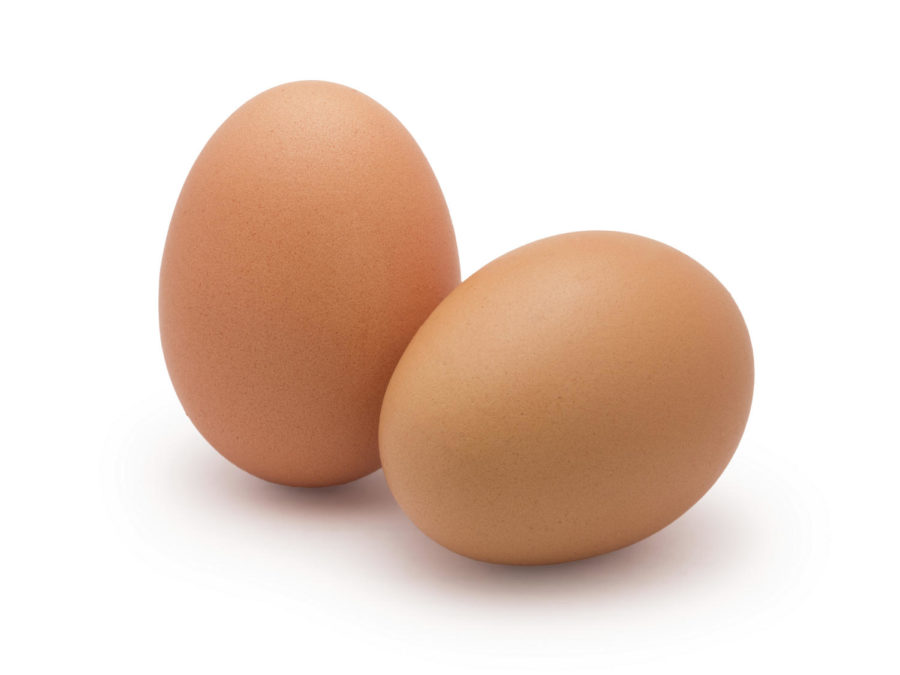California law puts the chicken before its eggs, threatens Iowa egg producers
A new California egg law affects Iowa egg production and distribution.
October 14, 2014
The chicken comes before the egg according to U.S. District Court Judge Kimberly Mueller.
Iowa and five other states filed a lawsuit Oct. 2 to overturn the 2010 California law that requires eggs coming into the state to be from chickens held in larger cages. Mueller dismissed the lawsuit.
The California law, which will go into effect Jan. 1, 2015, requires at least 116 square inches of space per chicken. That is slightly smaller than a standard sheet of legal paper. The industry standard is currently 67 square inches per chicken.
The law only applies to shelled eggs. Producers of liquid egg products, such as egg whites, do not face the same constraints.
“We’re about to see how a state law is going to impact other states,” said Lee Schulz, professor of economics in the College of Agriculture and Life Sciences.
Iowa is the number one producer of eggs in the country, and California imports more eggs than any other state.
“When you look at the distribution of Iowa eggs, it’s the East Coast and the West Coast that make up the large market,” Schulz said.
Iowa’s egg industry depends heavily on California. About 4 billion — 9 percent of all eggs produced in the United States — are sent to the California market.
Egg producers in Iowa and other states are not required to build new facilities, but they will be unable to sell their eggs in California if they do not.
“It’s likely that Iowa will build new housing to conform to the standards because the alternative is to lose the California market,” said Dermot Hayes, professor at the Iowa State Center for Rural and Agricultural Development.
The construction of each new individual chicken cage will cost about $26. It will cost Iowa more than $100 million to build new housing for chickens whose eggs are destined for the California egg market, Hayes said.
Chad Hart, economics professor at the Iowa State Center for Rural and Agricultural Development, said that the impact of the law on the Iowa egg industry may be less significant than many think.
California can only limit the number of eggs coming into their state market. Eggs that do not qualify for the California market will be sent to egg markets in surrounding states, so Iowa will have other markets where it can export its eggs.
“As the California market disappears given this law, other markets will expand to fill in at least part of the hole,” Hart said.
Another element Iowa egg producers must take into consideration is price. Because the number of eggs going to California will decrease as a result of the new law, the price of the eggs will increase. Iowa egg producers must decide the price increase will justify the construction costs of new housing for chickens.
“When you cut supply down, prices tend to rise,” said Hart. “The eggs are going to flow where the price is right.”
The law was originally passed with two aims in mind.
The law is an attempt to better the treatment of animals. California lawmakers believe the humane treatment of chickens should include giving them space to lie down, stand up and extend their wings.
The law was also put in place to eliminate California’s point of weakness in the egg-producing industry.
“California is at a competitive disadvantage in the egg industry,” Schulz said.
California egg producers are concerned they would be at a disadvantage when competing with egg producers in other states who are not subject to the same rules.
States that export eggs to California, like Iowa, have a competitive advantage because of the lower cost of housing chickens in smaller spaces. Forcing these states to adhere to the same chicken housing guidelines as California will rid California of the inherent competitive disadvantage in the egg producing industry, Schulz said.
The law has the potential to impact the country as a whole not only those states actively involved in the egg industry.
The Interstate Commerce Clause says that states cannot enact trade barriers against products from other states. Hayes said the new law will essentially ignore the Interstate Commerce Clause.
“California is about to do exactly that,” Hayes said. “Without the Interstate Commerce Clause, we would be 50 countries not 50 states.”
Hayes said that a large part of our country’s prosperity comes from free trade. Specialization allows states to use what resources they have available to produce goods that can be traded freely with other states.
If one state places a trade barrier on another state, such as the barrier to trade that California is placing on Iowa egg producers, other states may begin to do the same.
A barrier on the import of eggs may lead to more barriers on other items, Hayes said.
“It’s the snowball effect I worry about,” Hayes said. “Just pick your poison, and these things can snowball.”

















